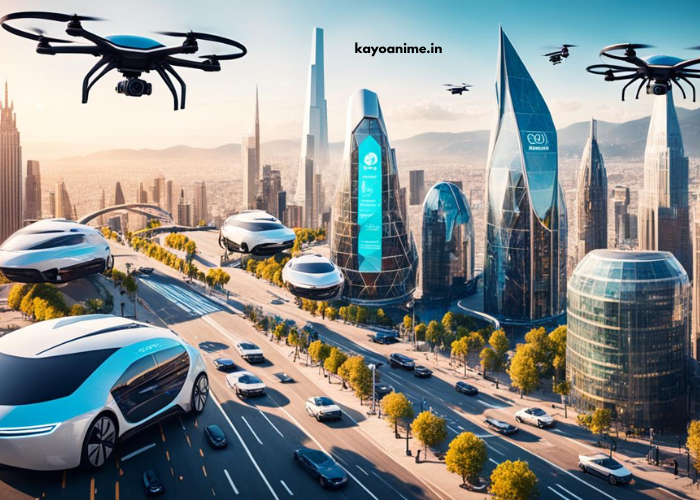The rapid evolution of Artificial Intelligence (AI) is transforming industries, economies, and daily life in ways previously unimaginable. AI is no longer confined to theoretical discussions or the realm of science fiction. Today, it plays a pivotal role in shaping a smarter future. From healthcare and education to business operations and sustainability, AI innovations are driving efficiency, productivity, and groundbreaking advancements across multiple sectors. In this article, we explore the latest AI innovations and how they contribute to creating a smarter, more connected world.
Understanding the AI Revolution
AI refers to the simulation of human intelligence processes by machines, especially computer systems. These processes include learning (the ability to improve performance through experience), reasoning (solving problems through logic), and self-correction. Over the years, AI has become a significant force for change, with applications spanning across various industries such as healthcare, finance, retail, transportation, and beyond.
The scope of AI innovations has expanded to include machine learning, deep learning, natural language processing, and robotics. These technologies enable systems to analyze large datasets, recognize patterns, automate tasks, and even predict future trends with high accuracy. As we look to the future, AI is poised to revolutionize every aspect of our lives, making them smarter, more efficient, and more interconnected.
AI in Healthcare: Revolutionizing Patient Care
AI is making significant strides in the healthcare sector, enhancing diagnosis accuracy, personalized treatment plans, and operational efficiency. Innovations like AI-powered diagnostic tools, predictive analytics, and robotic surgery are improving patient outcomes and reducing the burden on healthcare professionals.
AI-Powered Diagnostics and Personalized Medicine
One of the most significant AI innovations in healthcare is the development of AI-powered diagnostic tools. Machine learning algorithms can analyze medical images, such as X-rays, MRIs, and CT scans, to detect abnormalities like tumors, fractures, and infections. These tools can assist doctors in diagnosing conditions more accurately and swiftly, reducing human error and improving treatment outcomes.
Additionally, AI is transforming personalized medicine by using data from a patient’s genetic makeup, medical history, and lifestyle to tailor individualized treatment plans. AI-driven platforms help doctors identify the best treatment options, minimizing trial and error, and improving the effectiveness of interventions.
Predictive Analytics for Better Patient Outcomes
AI’s predictive capabilities are also being utilized to foresee health risks and prevent future complications. By analyzing historical data and identifying patterns in patient records, AI models can predict the likelihood of conditions such as heart disease, diabetes, or stroke. This allows healthcare providers to take proactive measures, such as early interventions and lifestyle recommendations, to prevent or manage chronic conditions effectively.
AI in Education: Shaping the Future of Learning
The education sector is experiencing a digital transformation driven by AI innovations that are creating personalized and adaptive learning environments. AI tools are reshaping the way students learn, interact with educators, and engage with educational content.
Personalized Learning Experiences
AI is revolutionizing education by enabling personalized learning experiences tailored to the individual needs of each student. Adaptive learning platforms powered by AI can analyze a student’s strengths, weaknesses, and learning style to offer customized lesson plans, assignments, and resources. This personalized approach helps students learn at their own pace, ensuring that they fully grasp concepts before moving on to more complex material.
AI-Driven EdTech Tools
AI is also playing a significant role in enhancing the effectiveness of educational technology (EdTech). Tools such as AI-based tutoring systems, language learning apps, and virtual teaching assistants are providing students with real-time feedback, helping them to stay on track with their studies. These innovations are making education more accessible and efficient, especially for learners in remote or underserved regions.
AI in Business: Automating and Optimizing Operations
AI is playing a critical role in transforming business operations, from automating repetitive tasks to providing deep insights that drive strategic decisions. Companies across industries are leveraging AI technologies to increase efficiency, reduce costs, and enhance customer satisfaction.
AI-Powered Automation and Robotic Process Automation (RPA)
Automation is one of the most powerful AI innovations in the business world. Robotic Process Automation (RPA) uses AI to automate routine tasks, such as data entry, invoice processing, and customer service inquiries. This reduces the need for human intervention in mundane tasks, allowing employees to focus on more strategic and creative work.
Furthermore, AI-powered chatbots and virtual assistants are revolutionizing customer service by providing instant responses to inquiries, handling complaints, and assisting with transactions. These AI systems continuously learn from interactions, improving their responses over time.
Data-Driven Decision Making
AI is also enhancing decision-making processes within businesses. Machine learning algorithms can analyze vast amounts of data, identify trends, and generate insights that are invaluable for executives and managers. For instance, AI tools can predict customer behavior, optimize supply chain logistics, and identify opportunities for cost savings. By incorporating AI into decision-making, businesses can operate more efficiently, make informed strategic choices, and stay competitive in the marketplace.
AI in Transportation: Driving the Future of Mobility
Transportation is another sector undergoing a profound transformation due to AI innovations. Autonomous vehicles, smart traffic management systems, and AI-enhanced navigation apps are changing the way we travel, making transportation safer, more efficient, and environmentally friendly.
Autonomous Vehicles
Self-driving cars are perhaps the most well-known AI innovation in the transportation industry. Powered by machine learning and computer vision, autonomous vehicles are capable of navigating roads, detecting obstacles, and making decisions in real-time. These vehicles promise to reduce traffic accidents caused by human error, decrease congestion, and provide greater mobility for individuals with disabilities or those who cannot drive.
Smart Traffic Management
AI is also being used to optimize traffic flow in urban areas. AI-powered traffic management systems analyze real-time data from cameras, sensors, and GPS devices to monitor traffic patterns and adjust traffic signals accordingly. This helps reduce congestion, improve fuel efficiency, and lower emissions. In the future, these systems could integrate with autonomous vehicles to create a seamless transportation ecosystem.
AI and Sustainability: A Path to a Greener Future
AI innovations are not only shaping smarter cities and industries but also contributing to a more sustainable future. From reducing energy consumption to advancing climate change research, AI is playing an important role in addressing the planet’s environmental challenges.
AI in Renewable Energy
AI is helping to optimize renewable energy sources like solar and wind power. Machine learning algorithms can predict energy generation patterns based on weather forecasts, time of day, and other variables. This allows energy companies to manage the supply of renewable energy more efficiently, reducing reliance on fossil fuels and minimizing waste.
AI in Environmental Monitoring
AI is also being used to monitor and protect the environment. AI-powered sensors can detect pollution levels in air and water, track deforestation, and monitor wildlife populations. These technologies help governments and organizations take timely action to prevent environmental degradation and preserve natural resources for future generations.
Ethical Considerations and Challenges of AI
While AI innovations offer countless benefits, they also raise significant ethical considerations. Issues such as data privacy, algorithmic bias, and job displacement are important challenges that must be addressed as AI continues to advance.
Data Privacy and Security
AI systems rely on vast amounts of data, including personal and sensitive information. Protecting the privacy and security of this data is crucial. Governments, businesses, and developers must collaborate to establish strong data protection policies and ensure that AI technologies are used responsibly.
Algorithmic Bias
AI algorithms are only as good as the data they are trained on. If the data used to train AI systems is biased, the resulting algorithms can perpetuate and amplify these biases. This can lead to unfair outcomes, such as discrimination in hiring practices, lending decisions, or criminal justice systems. It is essential to develop AI systems that are transparent, accountable, and designed to minimize bias.
Job Displacement and the Future of Work
The rise of AI automation raises concerns about job displacement. While AI has the potential to increase efficiency and reduce costs, it could also replace jobs that involve repetitive tasks. As AI continues to evolve, it is important to invest in reskilling and upskilling programs to ensure that workers can adapt to the changing job landscape.
Conclusion: A Smarter, More Connected Future
AI innovations are reshaping industries, improving daily life, and creating a smarter future for all. From enhancing healthcare and education to optimizing business operations and advancing sustainability efforts, AI is playing a central role in driving progress. However, as we continue to embrace AI, it is crucial to address the ethical challenges and ensure that these technologies are developed and used in ways that benefit society as a whole.
The future of AI is incredibly promising. As advancements in machine learning, deep learning, and other AI technologies continue to evolve, we can expect even more transformative innovations that will further enhance our quality of life and create a more efficient, interconnected world. Embracing AI responsibly and ethically will unlock a smarter future for generations to come





